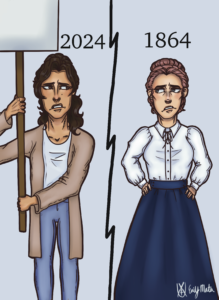
For the past few weeks, the Arizona Supreme Court has fostered debate on its upholding of a Civil War law enacted in 1864, a near-total ban on abortion. The court has heard three challenges altogether, and the third attempt has overturned it. It is appalling that an arcane Civil War law would be upheld, and this ruling directly threatens democracy.
Upholding this 160-year-old law would set the country back detrimentally. This law isn’t even a U.S. law; it was part of the racist Confederacy that no longer exists. Thankfully, Arizona’s legislature exercised some common sense and passed a bill to repeal the law. Three GOP legislators in the state’s House of Representatives defied party lines by siding with Democrats to abolish the Civil War law.
The Arizona State Senate is expected to consider a repeal vote in the upcoming week. Given that two Republican state senators have already backed the repeal effort, the law looks like it will be removed. However, if the legislature fails to effectively repeal the abortion ban, it risks perpetuating poorer health outcomes for women. Abortion bans have been shown to lead to increased risks of unsafe abortions and ultimately contribute to more women/people with uteruses dying. Lawmakers must prioritize modern healthcare needs and individual rights over outdated beliefs and laws.
As one of Arizona’s closest neighbors, Californians will be impacted by the enforcement of this law. Dobbs v. Jackson Women’s Health Organization, the case that overturned Roe v. Wade, was a devastating decision that compromised the medical privacy and security of millions of Americans. With numerous states making abortion access more difficult, California is left as one of the few major states protecting abortion access and protecting out-of-state abortion seekers.
An abortion ban in Arizona would cause an overflow for California clinics as it is one of the remaining states that legalized abortion nearest to Arizona. Thus, Arizona residents will go to where abortion is legal and can be safely done. There is hope to address a potential overflow of clinics in California as Gov. Gavin Newsom has proposed legislation that, if necessary, would allow abortion doctors from Arizona to work in California.

It’s also important to note that abortions don’t always pertain to a fetus; they can involve a range of medical circumstances, including cases such as removing abnormal tissue growth, as is the case with molar pregnancies or addressing a silent miscarriage that necessitates the same treatment as an abortion. The possible ban in Arizona endangers the medical care of more than just abortion seekers.
There are countless reasons why someone does or does not choose to have an abortion, and those reasons are valid. No one should be forced to have a child for any reason. When discussing the topic of abortion, everyone with the ability to become pregnant should have a say in what happens to their body; cisgender men cannot be allowed to have the final say.
There’s a clear double standard: women are expected to bear the responsibility for sexual activity, while men are not. An abortion ban and potential restrictions on men’s bodily choices, like mandated vasectomies, are essentially identical, yet the conversation around vasectomies is notably absent. It is unfair and threatens democracy because it denies individuals autonomy over their bodies and limits fundamental rights.
Upholding outdated laws, such as the 1864 Arizona Civil War abortion ban and current laws banning abortion, pose a significant threat to democracy by infringing on individual rights and limiting personal autonomy. These laws reflect a regressive approach that disregards evolving societal values and medical advancements. To protect democracy and promote a more just and equitable society, it is imperative to overturn such restrictive legislation and uphold the fundamental rights of all individuals through continued advocacy and action.







